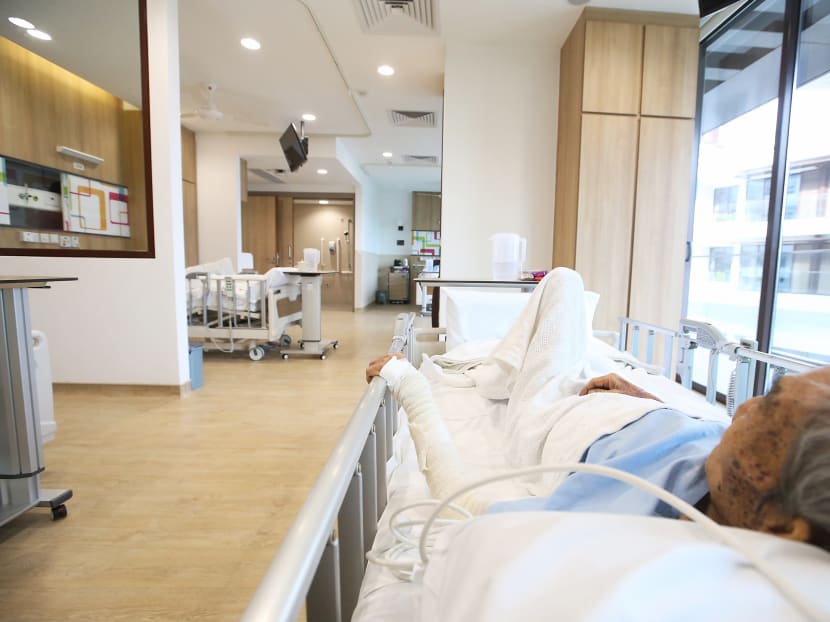MediShield Life coverage extended to 3 groups of patients
SINGAPORE — Patients admitted directly from the accident and emergency (A&E) departments of public hospitals to community hospitals are now covered under the national health insurance scheme MediShield Life, which protects against large hospital bills.
SINGAPORE — Patients admitted directly from the accident and emergency (A&E) departments of public hospitals to community hospitals are now covered under the national health insurance scheme MediShield Life, which protects against large hospital bills.
Previously, MediShield Life covered community hospital stays only for patients who came from an acute hospital after an inpatient stay.
MediShield Life coverage for this expanded group of patients began on July 15 and, since the start of this month, has expanded to two other groups of patients — those who need long-term intravenous nutrition, and children born with the rare congenital conditions of Trisomy 18 and alobar holoprosencephaly who need surgery.
MediShield Life premiums will not change for now, the Ministry of Health (MOH) said in a press release on Wednesday (Nov 7).
A review of premiums will be done by end-2020, about five years from the launch of MediShield Life, which offers universal coverage and better protection than the previous MediShield scheme, it added.
The ministry will continue to review MediShield Life regularly to ensure that it provides protection for Singaporeans against large hospitalisation bills and selected costly outpatient treatments, in keeping with developments in medical care.
FIRST GROUP OF PATIENTS
This would be those who are suitable for direct admissions from emergency departments to community hospitals. The MOH estimated that there are about 2,000 such patients a year.
From July to September this year, 70 patients have benefited from this admission route, an MOH spokesperson said.
Conditions that may be suitable for direct admission from an emergency department to a community hospital include urinary tract infection, non-surgical wound care requiring inpatient medical care, or inpatient rehabilitation to improve patients’ ability to perform daily activities.
Eligible patients can claim up to S$350 per day from MediShield Life, under the prevailing inpatient limit for community hospitals.
SECOND GROUP OF PATIENTS
This would be those who need intravenous nutrition, also called parenteral nutrition — where nutrition is delivered into the blood, bypassing the digestive system.
About 20 patients a month are on long-term parenteral nutrition feeds, the MOH said.
Patients who need parenteral nutrition for 90 days or more may now be covered under MediShield Life and can tap their Central Provident Fund Medisave accounts.
Patients must meet clinical criteria. For example, the person would have a disease of the stomach or intestine that significantly impairs the absorption of nutrients, and would have recently undergone small bowel resection leaving 1.5m or less of small bowel beyond a muscle called the ligament of Treitz.
Eligible patients may claim up to S$1,700 a month from MediShield Life and withdraw up to S$200 a month from Medisave for items necessary to administer parenteral nutrition.
THIRD GROUP OF PATIENTS
This would be those with Trisomy 18 and alobar holoprosencephaly.
Fewer than 10 people a year are born with these rare conditions in Singapore.
The conditions were fatal by nature in the past, but recent studies have shown that surgery can improve the quality of life and survival of these individuals, the MOH said.
MediShield Life began covering surgical interventions for the two conditions from this month, up to prevailing surgical claim limits of S$200 to S$2,000, depending on the complexity of the procedure.
Trisomy 18 is a chromosomal condition associated with abnormalities in many parts of the body, the United States National Library of Medicine stated. Affected individuals may have heart defects and abnormalities of other organs that develop before birth, and many individuals die before birth or within their first month. Of the children with this condition, 5 to 10 per cent live past their first year, and they often have severe intellectual disability, it said.
Holoprosencephaly is the failure of the forebrain to develop normally, the National Organisation for Rare Disorders in the US said. In its most severe form, which is alobar holoprosencephaly, there is no separation between the right and left halves of the forebrain at all.







